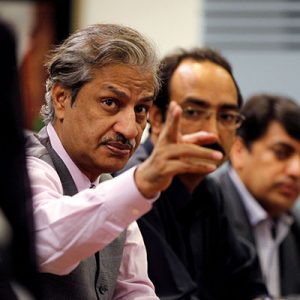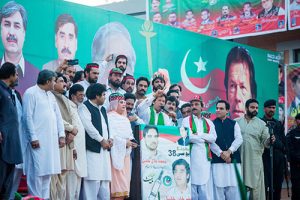The Pakistani media has transitioned from state-controlled to multistakeholder-controlled entities of independent news and entertainment channels that desperately vie for the eyeballs.
Generally speaking, the media sector is mired in a crisis of credibility. Fortunately, the print media still enjoys a certain measure of credibility; however, the electronic media, especially news channels, have proven to be shallow the way they approach, treat and broadcast information. The channels have grown in magnitude, but the quantity and quality of information have suffered. Pakistan’s media shamelessly uses its bullhorn to manipulate information to serve the interests of assorted stakeholders. Instead of treating its audiences as customers, the media uses them as baits to hook the advertising industry. Interestingly, the rating mechanism was created and developed by the Pakistan Advertisers Society for its clients, the advertisers. However, it has been grossly misused by the media industry.
Meanwhile, the regulatory bodies continue to ignore the basic corruption mechanisms, whereby every channel bribes the cable operator to achieve the desired positioning. It is unfortunate that instead of paying per subscriber (Rs. 5 for domestic and Rs. 1 for international channels), the channels have to pay around Rs. 1 million or more per month for acquiring prime positions.
Unfortunately, the channel’s positioning is used by both the state and non-state actors to influence the channel’s editorial policy.
The PPP Government of Prime Minister (PM) Yusuf Raza Gillani blundered by placing the National Accountability Bureau (NAB) under the Ministry of Law and the Pakistan Electronic Media Regulatory Authority (PEMRA) under the Ministry of Information and Broadcasting. Both acts compromised and limited the role of regulators. The government used the regulators’ offices to launch virulent attacks against ‘the Others,’ both in the form of nabbing the opposition or assassinating the opponents’ character.
The PMLN-government of PM Nawaz Sharif went one step further by appointing the under-qualified but loyal Absar Alam as Chairman, PEMRA. He, in violation of the rules, arrogated all the powers of the PEMRA Board to himself. The Board exonerated itself of all responsibility and empowered the Chairman to take all decisions independently.

Unfortunately, the media ecosystem did not raise its voice against these actions and failed to look at issues beyond the western-funded right to information agenda, thus indicating its lack of awareness and understanding of civil society.
With the arrival of the PTI Government under PM Imran Khan, the government’s advertising budget was slashed drastically and a major debate ensued on ad revenues and the share of assorted media entities from the public sector. PEMRA took charge of ensuring salaries for the journalists and media workers, making sure that the private channels did not fire employees without giving them proper compensation and documentation.
Unfortunately, none of the players asked the primary regulator, the Securities and Exchange Commission of Pakistan (SECP), to look into the companies’ governance structures. These outlets had obtained primary licenses to do business in Pakistan as per the laws of Pakistan under the principles of corporate governance.
The failure of the SECP and PEMRA, as regulators, to safeguard the public’s right to accurate information has led to the media becoming an information laundering mechanism for both state and non-state actors, within and outside of Pakistan.
Information laundering has become a handy tool for political parties in the country. It has divided the media into pro-and anti-lobbies vis-a-vis the players that matter in the country — be it the PML-N, the PTI or the Armed Forces — and even on sensitive issues of national and international security.

Information laundering has been part of the corporate spin as well — whether it is the telecom companies influencing fee structures for obtaining new licenses or the tobacco and beverage companies influencing the federal budgets to gain the desired public policy outcomes through unnamed sources on all media platforms, including outdoor, electronic, and print.
The Competition Commission of Pakistan has the remit to look into false information used to misguide the public or the public policy custodian. However, a regulator fighting for its own survival due to shortage of finances is faced with its own set of dangers. Hence, nobody dares to ask: who was involved in this information laundering? And why?
Interestingly, most of the regulatory bodies in Pakistan fail to publish their annual reports. This increases the cost of doing business in Pakistan and investors are expected to spend their own money on research for getting the basic data on Pakistan. For example, the Privatisation Commission brought out its last annual report in 2019, while the Board of Investment never issued its 2018-19 annual report.
The ultimate challenge before the PTI government are issues of governance and accountability. Accountability should extend beyond mere financial corruption. The vocabulary of corruption needs to evolve to differentiate between “actions not taken” and the malfeasance of public officials.
Pakistan needs watchdogs to monitor and manage the government and the regulators alike. But to quote from one of Aesop’s fables, “Who is going to bell the cat?”

The writer is a strategic communications professional.



